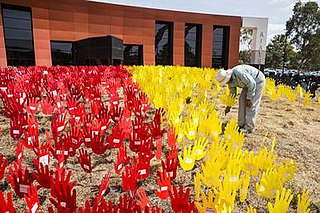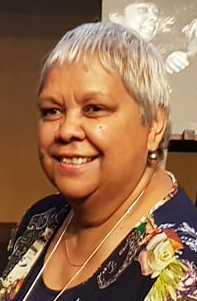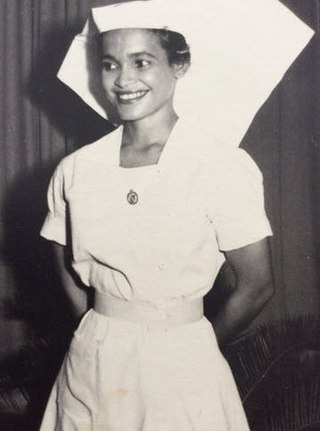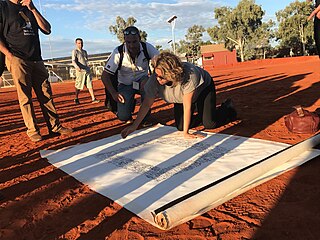Related Research Articles

The Aboriginal and Torres Strait Islander Commission (ATSIC) (1990–2005) was the Australian Government body through which Aboriginal Australians and Torres Strait Islanders were formally involved in the processes of government affecting their lives, established under the Hawke government in 1990. A number of Indigenous programs and organisations fell under the overall umbrella of ATSIC.
Reconciliation Australia is a non-government, not-for-profit foundation established in January 2001 to promote a continuing national focus for reconciliation between Indigenous and non-Indigenous Australians. It was established by the Council for Aboriginal Reconciliation, which was established to create a framework for furthering a government policy of reconciliation in Australia.

The Australian Institute of Aboriginal and Torres Strait Islander Studies (AIATSIS), established as the Australian Institute of Aboriginal Studies (AIAS) in 1964, is an independent Australian Government statutory authority. It is a collecting, publishing, and research institute and is considered to be Australia's premier resource for information about the cultures and societies of Aboriginal and Torres Strait Islander peoples.

Creative Australia, formerly known as the Australia Council for the Arts and the Australia Council, is the country's official arts council, serving as an arts funding and advisory body for the Government of Australia.
Indigenous Australian self-determination, also known as Aboriginal Australian self-determination, is the power relating to self-governance by Aboriginal and Torres Strait Islander peoples in Australia. It is the right of Aboriginal and Torres Strait Islander peoples to determine their own political status and pursue their own economic, social and cultural interests. Self-determination asserts that Aboriginal and Torres Strait Islander peoples should direct and implement Aboriginal and Torres Strait Islander policy formulation and provision of services. Self-determination encompasses both Aboriginal land rights and self-governance, and may also be supported by a treaty between a government and an Indigenous group in Australia.

The Redfern Park Speech, also known as the Redfern speech or Redfern address, was made on 10 December 1992 by the then Australian Prime Minister, Paul Keating, at Redfern Park, which is in Redfern, New South Wales, an inner city suburb of Sydney. The speech dealt with the challenges faced by Indigenous Australians, both Aboriginal Australian and Torres Strait Islander peoples. It is still remembered as one of the most powerful speeches in Australian history, both for its rhetorical eloquence and for its ground-breaking admission of the negative impact of white settlement in Australia on its Indigenous peoples, culture and society, in the first acknowledgement by the Australian Government of the dispossession of its First Peoples. It has been described as "a defining moment in the nation's reconciliation with its Aboriginal and Torres Strait Islander people".
The National Indigenous Council (NIC) was an appointed advisory body to the Australian Government through the Minister's for Indigenous Affairs' Taskforce on Indigenous Affairs (MTIA) established in November 2004, and wound up in early 2008. It was chaired by Sue Gordon, a Western Australian magistrate.

Jacqueline Gail "Jackie" Huggins is an Aboriginal Australian author, historian, academic and advocate for the rights of Indigenous Australians. She is a Bidjara/Pitjara, Birri Gubba and Juru woman from Queensland.
Barunga, formerly known as Beswick Creek and then Bamyili, is a small Aboriginal community located approximately 80 kilometres (50 mi) southeast of Katherine, in the Northern Territory of Australia. It is part of the Roper Gulf Region local government area. At the 2011 census, Barunga had a population of 313.
Tanya Hosch is an Indigenous Australian social activist and business executive. She has held leadership roles in sport, the arts, social justice and public policy. She was joint campaign manager of the "Recognise" campaign run by Reconciliation Australia from 2012 to 2016. At her appointment as social inclusion manager to the Australian Football League (AFL) in June 2016, she became the first Indigenous person and the second woman appointed to an executive position in the AFL.

Mick Gooda is an Aboriginal Australian public servant. He has particularly served as the Aboriginal and Torres Strait Islander Social Justice Commissioner of the Australian Human Rights Commission from 2009 to 2016 and as Co-Commissioner of the Royal Commission into the Protection and Detention of Children in the Northern Territory from 2016 to 2017. He is a descendant of the Gangulu people of Central Queensland.

MaryAnn Bin-Sallik is a Djaru Elder and Australian academic, specialising in Indigenous studies and culture. She was the first Indigenous Australian to gain a doctorate from Harvard University.

The Uluru Statement from the Heart is a 2017 petition to the people of Australia, written and endorsed by the Australian Aboriginal and Torres Strait Islander leaders selected as delegates to the First Nations National Constitutional Convention. The document calls for substantive constitutional change and structural reform through the creation of two new institutions; a constitutionally protected First Nations Voice and a Makarrata Commission, to oversee agreement-making and truth-telling between governments and First Nations. Such reforms should be implemented, it is argued, both in recognition of the continuing sovereignty of Indigenous peoples and to address structural power differences that has led to severe disparities between Indigenous and non-Indigenous Australians. These reforms can be summarised as Voice, Treaty and Truth.
Close the Gap (CTG) is a social justice campaign focused on Indigenous Australians' health, in which peak Aboriginal and Torres Strait Islander and non-Indigenous health bodies, NGOs and human rights organisations work together to achieve health equality in Australia. The Campaign was launched in April 2007. National Close the Gap Day (NCTGD) has been held annually since 2009.

The Aboriginal and Torres Strait Islander Voice, also known as the Indigenous Voice to Parliament, the First Nations Voice or simply the Voice, was a proposed Australian federal advisory body to comprise Aboriginal and Torres Strait Islander people, to represent the views of Indigenous communities.
Djambawa Marawili is an Aboriginal Australian artist known for bark painting, wood sculpture, and printmaking. He is also a musician, and released an album in 2008.
Constitutional recognition of Indigenous Australians refers to various proposals for changes to the Australian Constitution to recognise Indigenous Australians in the document. Various proposals have been suggested to symbolically recognise the special place Indigenous Australians have as the first peoples of Australia, along with substantial changes, such as prohibitions on racial discrimination, the protection of languages and the addition of new institutions. In 2017, the Uluru Statement from the Heart was released by Indigenous leaders, which called for the establishment of an Indigenous Voice to Parliament as their preferred form of recognition. When submitted to a national referendum in 2023 by the Albanese government, the proposal was heavily defeated.
Bäniyala is a tiny community of Aboriginal Australian people, known as a homeland, situated on Blue Mud Bay in the Gulf of Carpentaria in East Arnhem Land in the Northern Territory of Australia, located 210 kilometres (130 mi) from Nhulunbuy. It is home to about 150 Yolŋu people.
Australian Indigenous advisory bodies are Aboriginal and Torres Strait Islander advisory bodies established or proposed to be established by the Commonwealth and state and territory governments. Calls for such bodies, especially for a Commonwealth level Voice to Parliament, became prominent following the release of the Uluru Statement from the Heart, however similar bodies of various levels of independence have existed since the official end of assimilationist policies in the 1970s and the promotion of self-determination and reconciliation. Such bodies generally advise governments on policies and programmes that affect Indigenous Australians, and represent Indigenous interests in public debate. Other advisory bodies have been established in the context of state treaty process, to advise governments and Indigenous groups to prepare for upcoming negotiations.
References
- 1 2 3 4 "Prime Minister's Indigenous Advisory Council". Directory. Australian Government. 25 May 2017. Retrieved 23 August 2023.
- ↑ "Prime Minister's Announcement: Membership of the Indigenous Advisory Council". indigenous.gov.au. Australian Government. 23 November 2013. Retrieved 6 February 2021.
- 1 2 3 "First Meeting of the Prime Minister's Indigenous Advisory Council". Department of the Prime Minister and Cabinet . Tony Abbott [Media release]. Australian Government. 5 December 2013. Retrieved 6 February 2021.
- ↑ Turnbull, Malcolm (11 February 2018). "Working with Aboriginal and Torres Strait Islander people for a better Australia". National Indigenous Australians Agency . Retrieved 6 February 2021.
- ↑ Karvelas, Patricia (1 February 2017). "Malcolm Turnbull dissolves Indigenous Advisory Council, but 'commitment remains'". ABC News. Australian Broadcasting Corporation . Retrieved 6 February 2021.
- ↑ "Terms of Reference: Indigenous Advisory Council". National Indigenous Australians Agency . Australian Government. 26 July 2016. Retrieved 6 February 2021.
- 1 2 "Prime Minister's Indigenous Advisory Council". National Indigenous Australians Agency . Australian Government. 8 February 2017. Archived from the original on 6 February 2021. Retrieved 6 February 2021.
- 1 2 Karvelas, Patricia (8 February 2017). "Indigenous Advisory Council 'refreshed' with new membership". ABC News. Australian Broadcasting Corporation . Retrieved 6 February 2021.
- 1 2 "NSW Land Rights Chair appointed as Co-Chair of the PM's Indigenous Advisory Council". NSW Aboriginal Land Council. 28 June 2018. Retrieved 6 February 2021.
- 1 2 "National Congress wants to work with PM's new advisory council..." CAAMA Radio. 9 February 2017. Archived from the original (Includes audio interview with Jackie Huggins.) on 15 February 2017. Retrieved 6 February 2021.